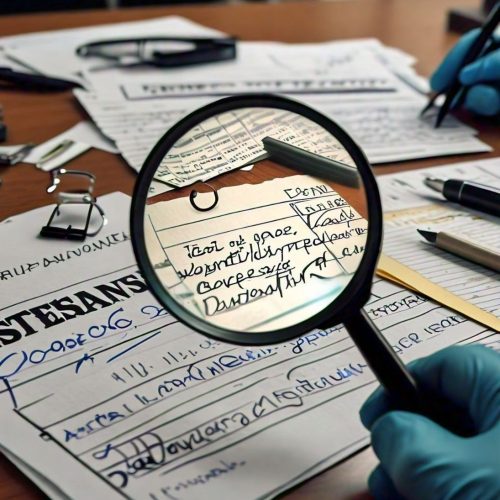FAQS-ON-FORENSIC-HANDWRITING-EXAMINATION-SIGNATURE-VERIFICATION

BFI provides hand-on-forensic training as well as online training on forensic handwriting examination and signature verification to forensic aspirants, lawyers, police officials all over National and at International level. We also provide practical exposure which covers broader aspects of questioned document field as well as other forensic science disciplines.
Our forensic training on questioned document enables the forensic aspirants, lawyers, corporate officials, police officials, college students with Bachelors/Masters degree in forensic science or in any other field of life sciences, professional etc.
Forensic handwriting examination is the process of analyzing a handwritten document to determine its authenticity and authorship. Experts examine various elements like letter formation, pressure, and slant to verify if the handwriting matches a specific individual.
When conducted by qualified experts, handwriting and signature analysis can be highly accurate. However, some factors, such as age, health, or sample quality, can impact the reliability of the analysis. Experts often give probability-based conclusions to reflect these nuances.
Yes, handwriting analysis is generally reliable, but it is often used alongside other evidence in forensic cases. Courts tend to accept handwriting analysis if conducted by a certified expert, though its acceptance varies by jurisdiction.
Yes, handwriting and signature analysis can be performed on digital documents as long as the original scanned document is clear and unaltered. However, the original physical document often provides the best source for accurate examination.
While general features of handwriting can be similar among individuals, each person’s writing typically has unique, identifiable characteristics. Forensic examiners focus on identifying these specific traits.
Yes, courts generally accept handwriting and signature analysis, provided the analysis is scientifically conducted and presented by a qualified expert. However, admissibility may vary by jurisdiction, and the credibility of the findings can depend on the expert’s qualifications.
Yes, forensic experts can often detect attempts at disguise or forgery by identifying unnatural pauses, inconsistent pressure, or irregularities in letter formation. These signs indicate a lack of fluency typically present in genuine handwriting.
A candidate with graduation or Post graduation in Forensic Science or in any other field of science is eligible to become forensic handwriting expert. One can also become certified forensic handwriting expert after completion of forensic handwriting examination and signature verification course from any recognized forensic organization.
